Ethical Analysis of Students and Sensors: Data, Privacy, Research
VerifiedAdded on 2023/06/07
|6
|1835
|438
Essay
AI Summary
This essay provides a comprehensive ethical analysis of the "Students and Sensors" case, which involves the University of Arizona's use of student data collected through CatCards and proposed Wi-Fi hubs to predict student attrition. The analysis applies four classical ethical theories: Utilitarianism, Deontology, Virtue Ethics, and Contract Ethics, to evaluate the ethical implications of the university's actions. The essay examines the privacy concerns arising from the collection of student data without consent, the potential misuse of such data, and the lack of transparency in the data collection process. The essay argues that the university's actions are unethical based on violations of each of the four ethical theories. The conclusion recommends that the university should prioritize transparency, obtain informed consent, and provide students with the option to opt out of data collection to address the ethical issues and maintain its reputation.
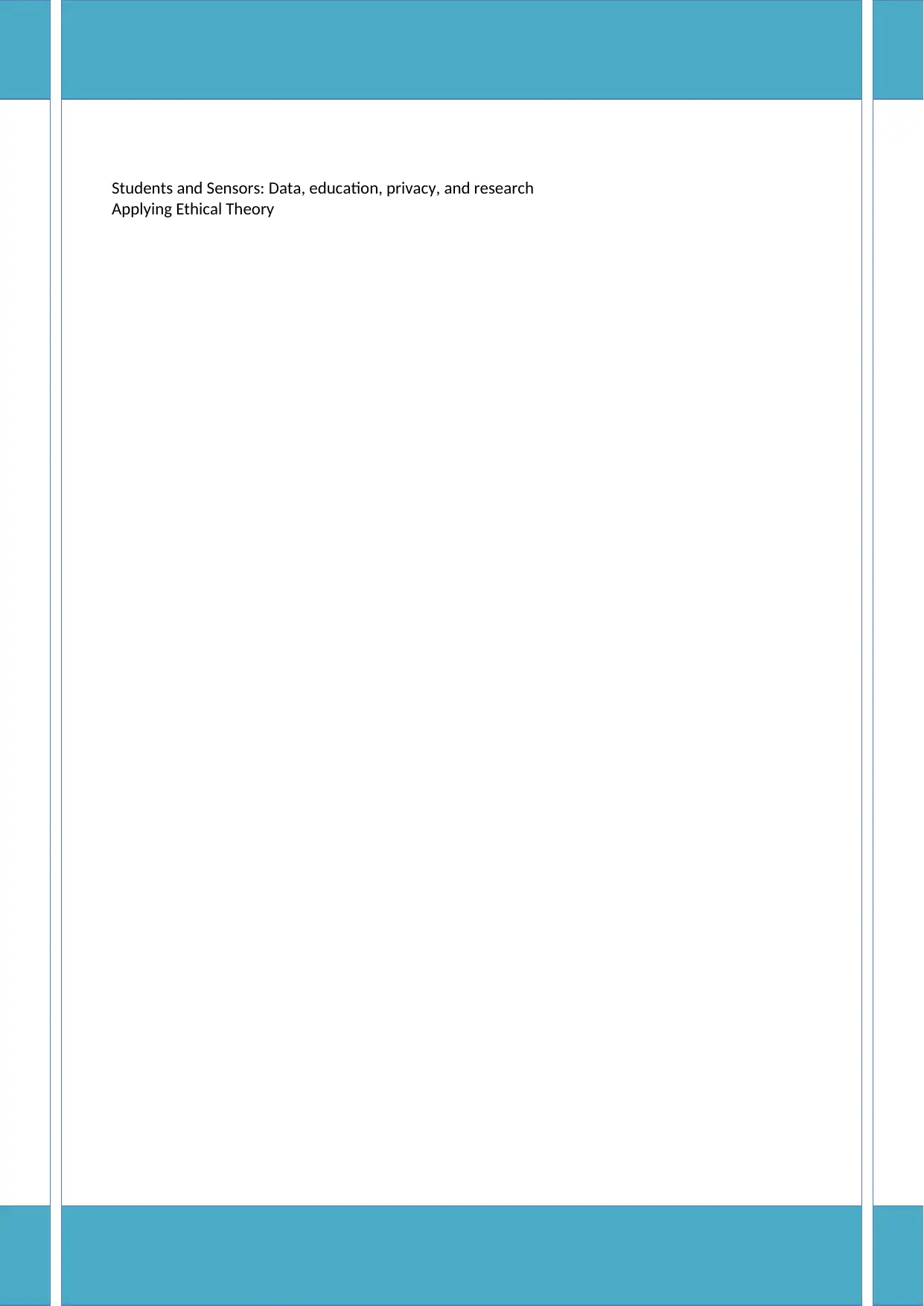
Students and Sensors: Data, education, privacy, and research
Applying Ethical Theory
Applying Ethical Theory
Paraphrase This Document
Need a fresh take? Get an instant paraphrase of this document with our AI Paraphraser
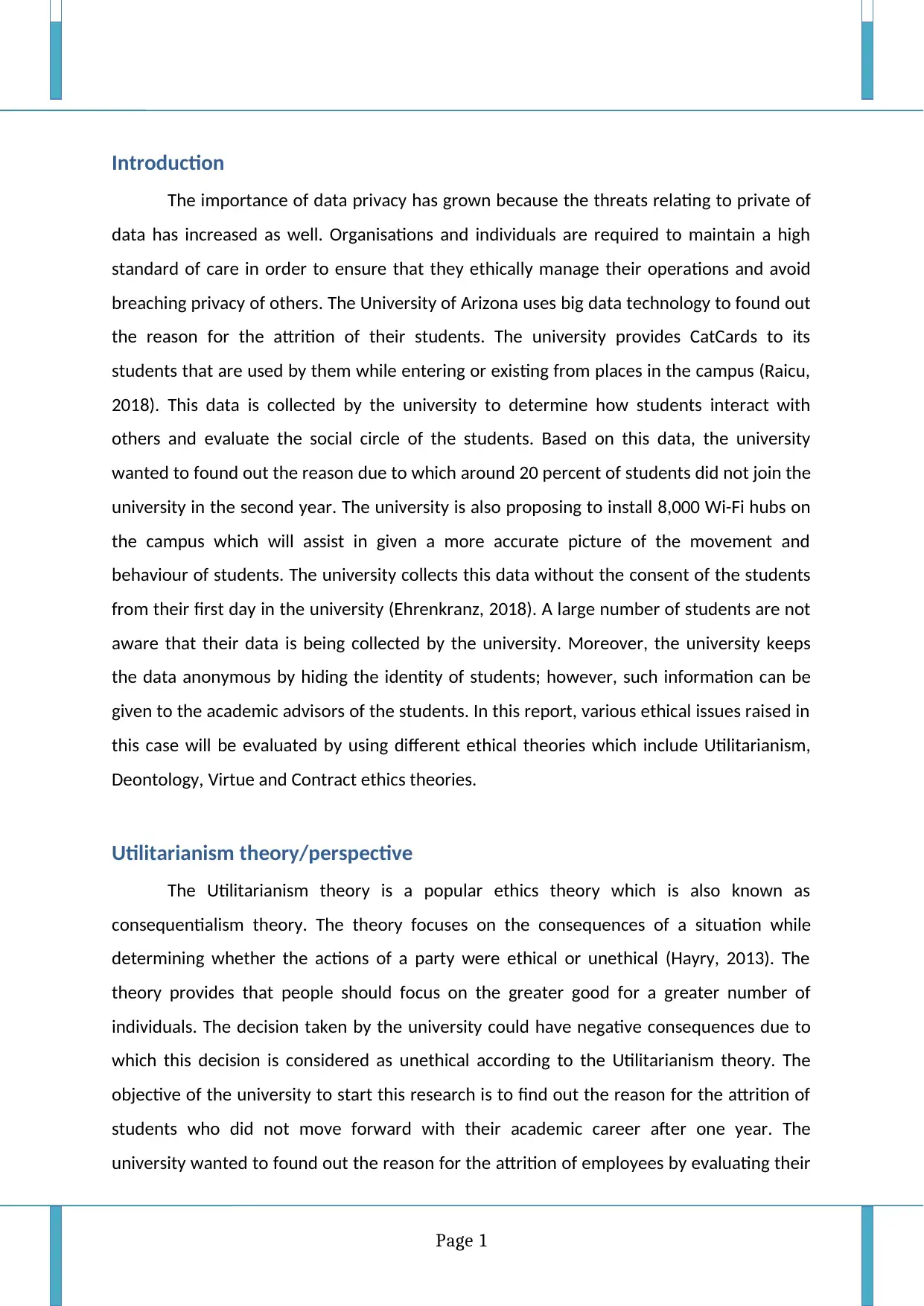
Introduction
The importance of data privacy has grown because the threats relating to private of
data has increased as well. Organisations and individuals are required to maintain a high
standard of care in order to ensure that they ethically manage their operations and avoid
breaching privacy of others. The University of Arizona uses big data technology to found out
the reason for the attrition of their students. The university provides CatCards to its
students that are used by them while entering or existing from places in the campus (Raicu,
2018). This data is collected by the university to determine how students interact with
others and evaluate the social circle of the students. Based on this data, the university
wanted to found out the reason due to which around 20 percent of students did not join the
university in the second year. The university is also proposing to install 8,000 Wi-Fi hubs on
the campus which will assist in given a more accurate picture of the movement and
behaviour of students. The university collects this data without the consent of the students
from their first day in the university (Ehrenkranz, 2018). A large number of students are not
aware that their data is being collected by the university. Moreover, the university keeps
the data anonymous by hiding the identity of students; however, such information can be
given to the academic advisors of the students. In this report, various ethical issues raised in
this case will be evaluated by using different ethical theories which include Utilitarianism,
Deontology, Virtue and Contract ethics theories.
Utilitarianism theory/perspective
The Utilitarianism theory is a popular ethics theory which is also known as
consequentialism theory. The theory focuses on the consequences of a situation while
determining whether the actions of a party were ethical or unethical (Hayry, 2013). The
theory provides that people should focus on the greater good for a greater number of
individuals. The decision taken by the university could have negative consequences due to
which this decision is considered as unethical according to the Utilitarianism theory. The
objective of the university to start this research is to find out the reason for the attrition of
students who did not move forward with their academic career after one year. The
university wanted to found out the reason for the attrition of employees by evaluating their
Page 1
The importance of data privacy has grown because the threats relating to private of
data has increased as well. Organisations and individuals are required to maintain a high
standard of care in order to ensure that they ethically manage their operations and avoid
breaching privacy of others. The University of Arizona uses big data technology to found out
the reason for the attrition of their students. The university provides CatCards to its
students that are used by them while entering or existing from places in the campus (Raicu,
2018). This data is collected by the university to determine how students interact with
others and evaluate the social circle of the students. Based on this data, the university
wanted to found out the reason due to which around 20 percent of students did not join the
university in the second year. The university is also proposing to install 8,000 Wi-Fi hubs on
the campus which will assist in given a more accurate picture of the movement and
behaviour of students. The university collects this data without the consent of the students
from their first day in the university (Ehrenkranz, 2018). A large number of students are not
aware that their data is being collected by the university. Moreover, the university keeps
the data anonymous by hiding the identity of students; however, such information can be
given to the academic advisors of the students. In this report, various ethical issues raised in
this case will be evaluated by using different ethical theories which include Utilitarianism,
Deontology, Virtue and Contract ethics theories.
Utilitarianism theory/perspective
The Utilitarianism theory is a popular ethics theory which is also known as
consequentialism theory. The theory focuses on the consequences of a situation while
determining whether the actions of a party were ethical or unethical (Hayry, 2013). The
theory provides that people should focus on the greater good for a greater number of
individuals. The decision taken by the university could have negative consequences due to
which this decision is considered as unethical according to the Utilitarianism theory. The
objective of the university to start this research is to find out the reason for the attrition of
students who did not move forward with their academic career after one year. The
university wanted to found out the reason for the attrition of employees by evaluating their
Page 1
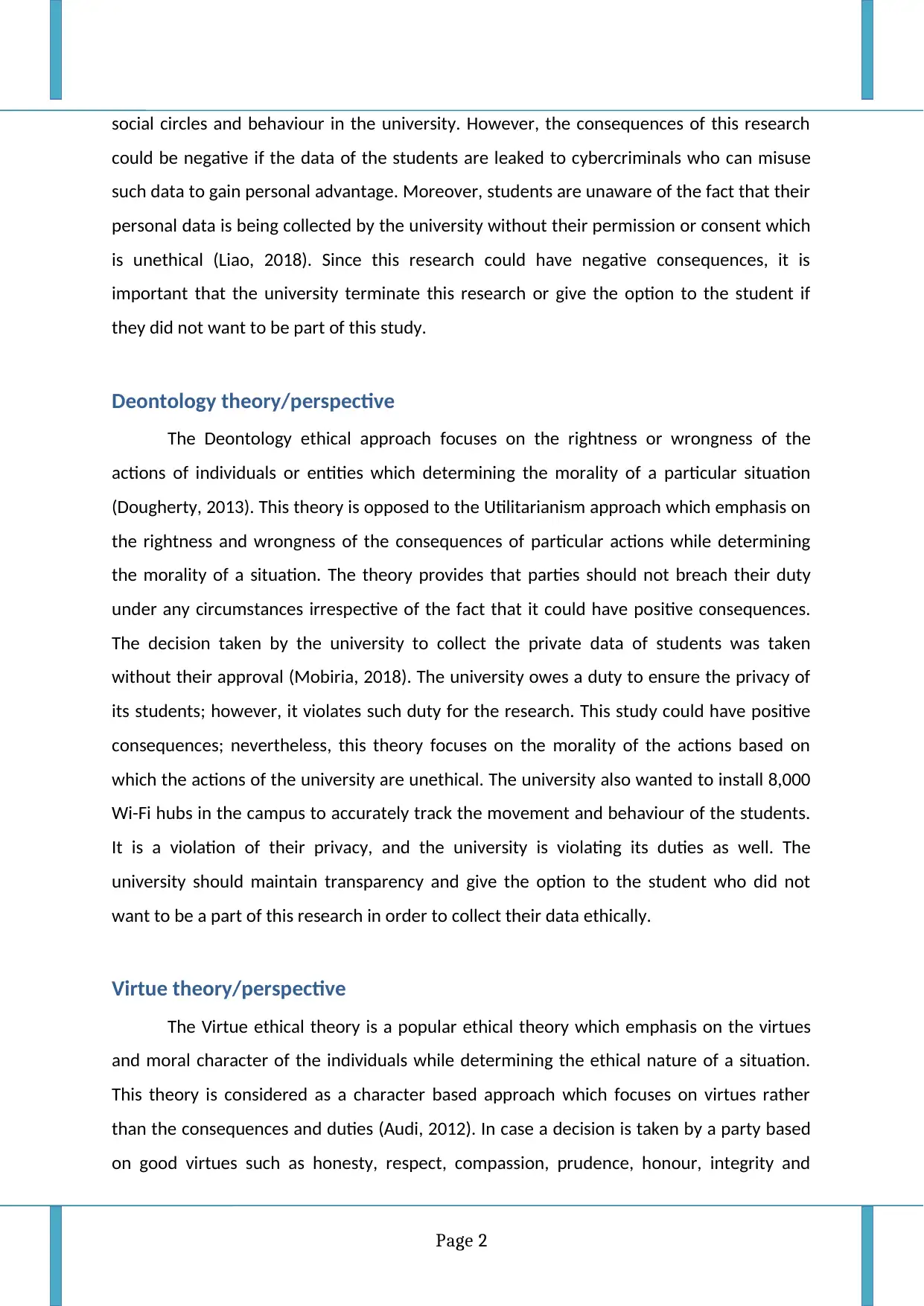
social circles and behaviour in the university. However, the consequences of this research
could be negative if the data of the students are leaked to cybercriminals who can misuse
such data to gain personal advantage. Moreover, students are unaware of the fact that their
personal data is being collected by the university without their permission or consent which
is unethical (Liao, 2018). Since this research could have negative consequences, it is
important that the university terminate this research or give the option to the student if
they did not want to be part of this study.
Deontology theory/perspective
The Deontology ethical approach focuses on the rightness or wrongness of the
actions of individuals or entities which determining the morality of a particular situation
(Dougherty, 2013). This theory is opposed to the Utilitarianism approach which emphasis on
the rightness and wrongness of the consequences of particular actions while determining
the morality of a situation. The theory provides that parties should not breach their duty
under any circumstances irrespective of the fact that it could have positive consequences.
The decision taken by the university to collect the private data of students was taken
without their approval (Mobiria, 2018). The university owes a duty to ensure the privacy of
its students; however, it violates such duty for the research. This study could have positive
consequences; nevertheless, this theory focuses on the morality of the actions based on
which the actions of the university are unethical. The university also wanted to install 8,000
Wi-Fi hubs in the campus to accurately track the movement and behaviour of the students.
It is a violation of their privacy, and the university is violating its duties as well. The
university should maintain transparency and give the option to the student who did not
want to be a part of this research in order to collect their data ethically.
Virtue theory/perspective
The Virtue ethical theory is a popular ethical theory which emphasis on the virtues
and moral character of the individuals while determining the ethical nature of a situation.
This theory is considered as a character based approach which focuses on virtues rather
than the consequences and duties (Audi, 2012). In case a decision is taken by a party based
on good virtues such as honesty, respect, compassion, prudence, honour, integrity and
Page 2
could be negative if the data of the students are leaked to cybercriminals who can misuse
such data to gain personal advantage. Moreover, students are unaware of the fact that their
personal data is being collected by the university without their permission or consent which
is unethical (Liao, 2018). Since this research could have negative consequences, it is
important that the university terminate this research or give the option to the student if
they did not want to be part of this study.
Deontology theory/perspective
The Deontology ethical approach focuses on the rightness or wrongness of the
actions of individuals or entities which determining the morality of a particular situation
(Dougherty, 2013). This theory is opposed to the Utilitarianism approach which emphasis on
the rightness and wrongness of the consequences of particular actions while determining
the morality of a situation. The theory provides that parties should not breach their duty
under any circumstances irrespective of the fact that it could have positive consequences.
The decision taken by the university to collect the private data of students was taken
without their approval (Mobiria, 2018). The university owes a duty to ensure the privacy of
its students; however, it violates such duty for the research. This study could have positive
consequences; nevertheless, this theory focuses on the morality of the actions based on
which the actions of the university are unethical. The university also wanted to install 8,000
Wi-Fi hubs in the campus to accurately track the movement and behaviour of the students.
It is a violation of their privacy, and the university is violating its duties as well. The
university should maintain transparency and give the option to the student who did not
want to be a part of this research in order to collect their data ethically.
Virtue theory/perspective
The Virtue ethical theory is a popular ethical theory which emphasis on the virtues
and moral character of the individuals while determining the ethical nature of a situation.
This theory is considered as a character based approach which focuses on virtues rather
than the consequences and duties (Audi, 2012). In case a decision is taken by a party based
on good virtues such as honesty, respect, compassion, prudence, honour, integrity and
Page 2
⊘ This is a preview!⊘
Do you want full access?
Subscribe today to unlock all pages.

Trusted by 1+ million students worldwide
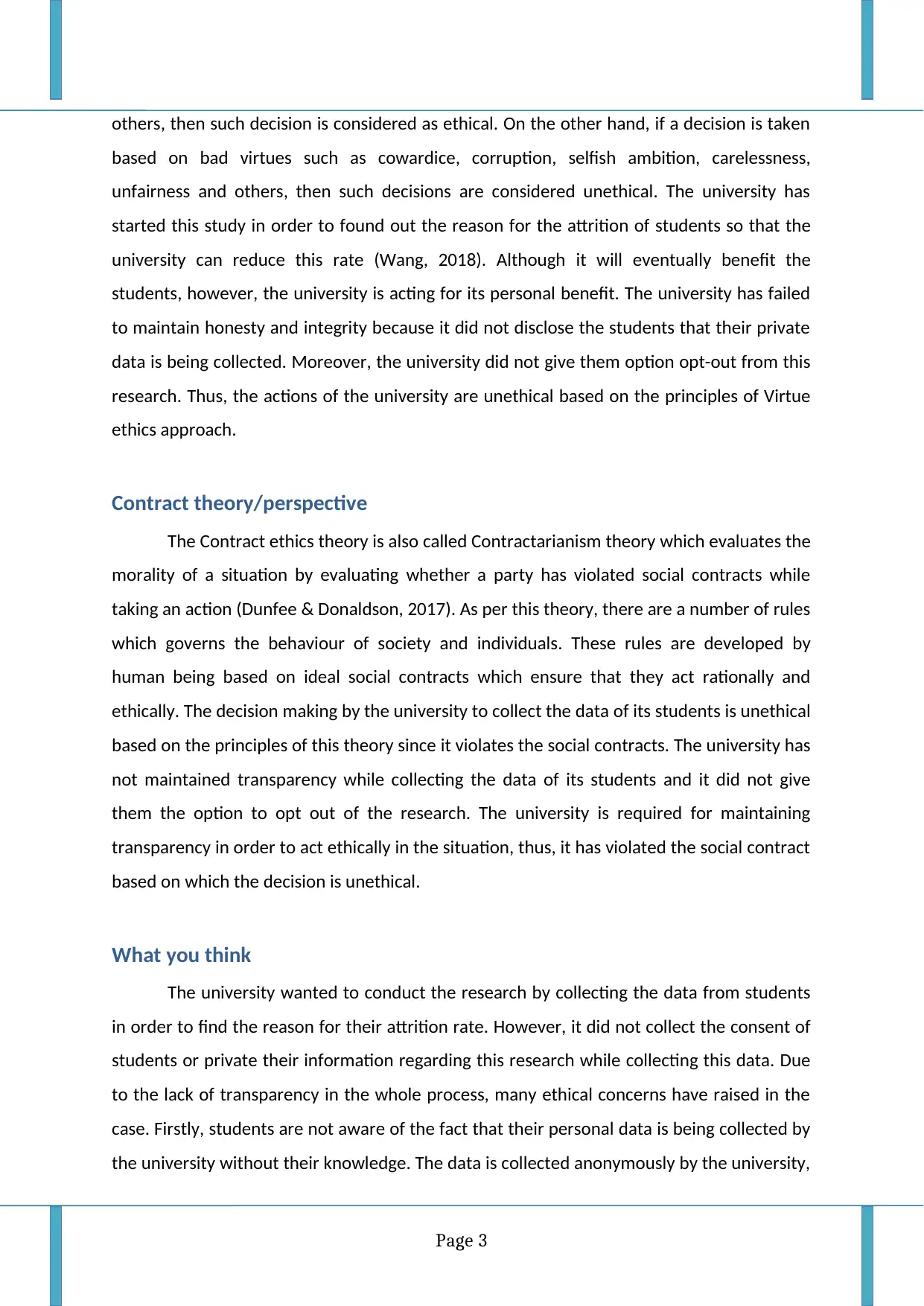
others, then such decision is considered as ethical. On the other hand, if a decision is taken
based on bad virtues such as cowardice, corruption, selfish ambition, carelessness,
unfairness and others, then such decisions are considered unethical. The university has
started this study in order to found out the reason for the attrition of students so that the
university can reduce this rate (Wang, 2018). Although it will eventually benefit the
students, however, the university is acting for its personal benefit. The university has failed
to maintain honesty and integrity because it did not disclose the students that their private
data is being collected. Moreover, the university did not give them option opt-out from this
research. Thus, the actions of the university are unethical based on the principles of Virtue
ethics approach.
Contract theory/perspective
The Contract ethics theory is also called Contractarianism theory which evaluates the
morality of a situation by evaluating whether a party has violated social contracts while
taking an action (Dunfee & Donaldson, 2017). As per this theory, there are a number of rules
which governs the behaviour of society and individuals. These rules are developed by
human being based on ideal social contracts which ensure that they act rationally and
ethically. The decision making by the university to collect the data of its students is unethical
based on the principles of this theory since it violates the social contracts. The university has
not maintained transparency while collecting the data of its students and it did not give
them the option to opt out of the research. The university is required for maintaining
transparency in order to act ethically in the situation, thus, it has violated the social contract
based on which the decision is unethical.
What you think
The university wanted to conduct the research by collecting the data from students
in order to find the reason for their attrition rate. However, it did not collect the consent of
students or private their information regarding this research while collecting this data. Due
to the lack of transparency in the whole process, many ethical concerns have raised in the
case. Firstly, students are not aware of the fact that their personal data is being collected by
the university without their knowledge. The data is collected anonymously by the university,
Page 3
based on bad virtues such as cowardice, corruption, selfish ambition, carelessness,
unfairness and others, then such decisions are considered unethical. The university has
started this study in order to found out the reason for the attrition of students so that the
university can reduce this rate (Wang, 2018). Although it will eventually benefit the
students, however, the university is acting for its personal benefit. The university has failed
to maintain honesty and integrity because it did not disclose the students that their private
data is being collected. Moreover, the university did not give them option opt-out from this
research. Thus, the actions of the university are unethical based on the principles of Virtue
ethics approach.
Contract theory/perspective
The Contract ethics theory is also called Contractarianism theory which evaluates the
morality of a situation by evaluating whether a party has violated social contracts while
taking an action (Dunfee & Donaldson, 2017). As per this theory, there are a number of rules
which governs the behaviour of society and individuals. These rules are developed by
human being based on ideal social contracts which ensure that they act rationally and
ethically. The decision making by the university to collect the data of its students is unethical
based on the principles of this theory since it violates the social contracts. The university has
not maintained transparency while collecting the data of its students and it did not give
them the option to opt out of the research. The university is required for maintaining
transparency in order to act ethically in the situation, thus, it has violated the social contract
based on which the decision is unethical.
What you think
The university wanted to conduct the research by collecting the data from students
in order to find the reason for their attrition rate. However, it did not collect the consent of
students or private their information regarding this research while collecting this data. Due
to the lack of transparency in the whole process, many ethical concerns have raised in the
case. Firstly, students are not aware of the fact that their personal data is being collected by
the university without their knowledge. The data is collected anonymously by the university,
Page 3
Paraphrase This Document
Need a fresh take? Get an instant paraphrase of this document with our AI Paraphraser
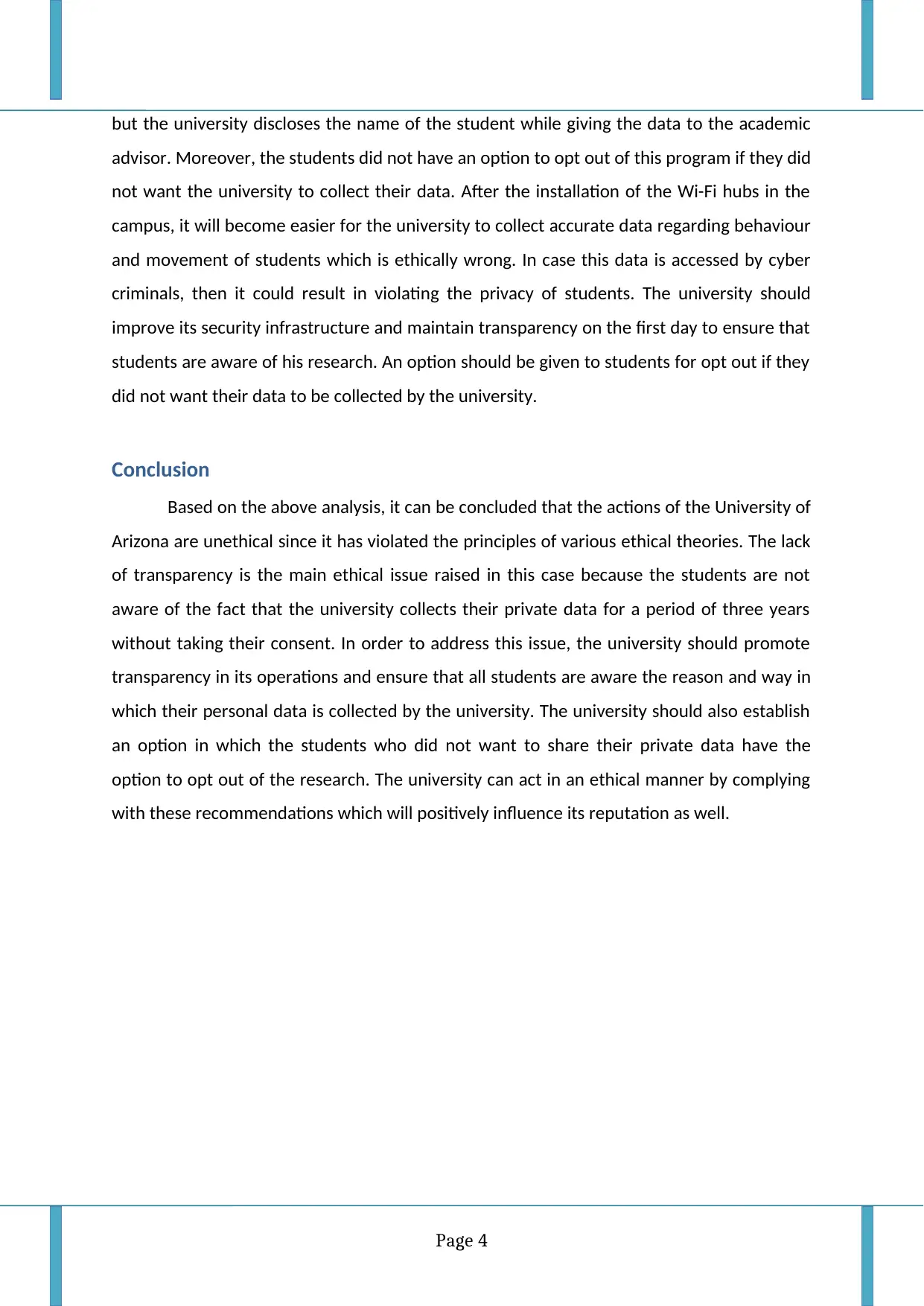
but the university discloses the name of the student while giving the data to the academic
advisor. Moreover, the students did not have an option to opt out of this program if they did
not want the university to collect their data. After the installation of the Wi-Fi hubs in the
campus, it will become easier for the university to collect accurate data regarding behaviour
and movement of students which is ethically wrong. In case this data is accessed by cyber
criminals, then it could result in violating the privacy of students. The university should
improve its security infrastructure and maintain transparency on the first day to ensure that
students are aware of his research. An option should be given to students for opt out if they
did not want their data to be collected by the university.
Conclusion
Based on the above analysis, it can be concluded that the actions of the University of
Arizona are unethical since it has violated the principles of various ethical theories. The lack
of transparency is the main ethical issue raised in this case because the students are not
aware of the fact that the university collects their private data for a period of three years
without taking their consent. In order to address this issue, the university should promote
transparency in its operations and ensure that all students are aware the reason and way in
which their personal data is collected by the university. The university should also establish
an option in which the students who did not want to share their private data have the
option to opt out of the research. The university can act in an ethical manner by complying
with these recommendations which will positively influence its reputation as well.
Page 4
advisor. Moreover, the students did not have an option to opt out of this program if they did
not want the university to collect their data. After the installation of the Wi-Fi hubs in the
campus, it will become easier for the university to collect accurate data regarding behaviour
and movement of students which is ethically wrong. In case this data is accessed by cyber
criminals, then it could result in violating the privacy of students. The university should
improve its security infrastructure and maintain transparency on the first day to ensure that
students are aware of his research. An option should be given to students for opt out if they
did not want their data to be collected by the university.
Conclusion
Based on the above analysis, it can be concluded that the actions of the University of
Arizona are unethical since it has violated the principles of various ethical theories. The lack
of transparency is the main ethical issue raised in this case because the students are not
aware of the fact that the university collects their private data for a period of three years
without taking their consent. In order to address this issue, the university should promote
transparency in its operations and ensure that all students are aware the reason and way in
which their personal data is collected by the university. The university should also establish
an option in which the students who did not want to share their private data have the
option to opt out of the research. The university can act in an ethical manner by complying
with these recommendations which will positively influence its reputation as well.
Page 4
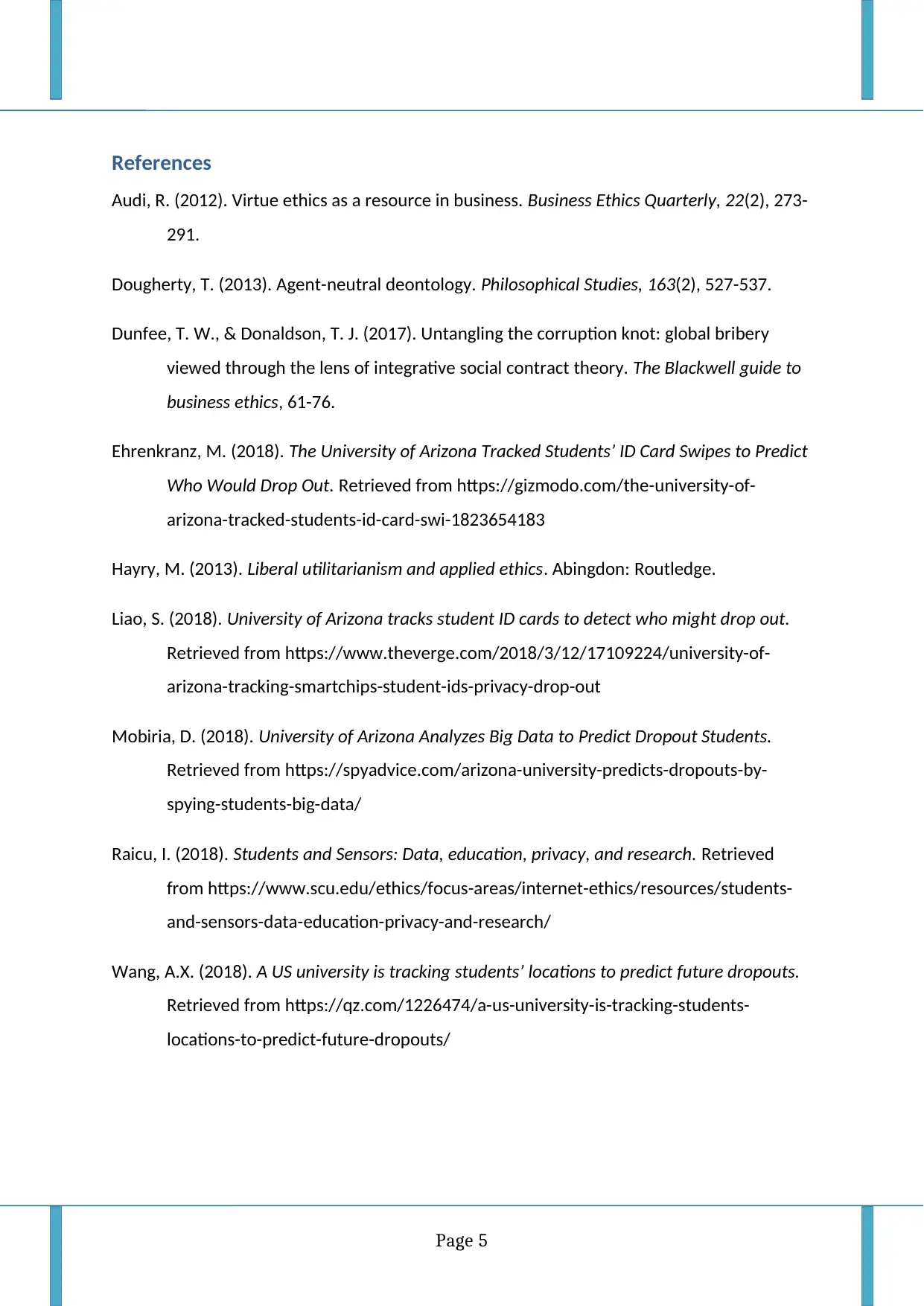
References
Audi, R. (2012). Virtue ethics as a resource in business. Business Ethics Quarterly, 22(2), 273-
291.
Dougherty, T. (2013). Agent-neutral deontology. Philosophical Studies, 163(2), 527-537.
Dunfee, T. W., & Donaldson, T. J. (2017). Untangling the corruption knot: global bribery
viewed through the lens of integrative social contract theory. The Blackwell guide to
business ethics, 61-76.
Ehrenkranz, M. (2018). The University of Arizona Tracked Students’ ID Card Swipes to Predict
Who Would Drop Out. Retrieved from https://gizmodo.com/the-university-of-
arizona-tracked-students-id-card-swi-1823654183
Hayry, M. (2013). Liberal utilitarianism and applied ethics. Abingdon: Routledge.
Liao, S. (2018). University of Arizona tracks student ID cards to detect who might drop out.
Retrieved from https://www.theverge.com/2018/3/12/17109224/university-of-
arizona-tracking-smartchips-student-ids-privacy-drop-out
Mobiria, D. (2018). University of Arizona Analyzes Big Data to Predict Dropout Students.
Retrieved from https://spyadvice.com/arizona-university-predicts-dropouts-by-
spying-students-big-data/
Raicu, I. (2018). Students and Sensors: Data, education, privacy, and research. Retrieved
from https://www.scu.edu/ethics/focus-areas/internet-ethics/resources/students-
and-sensors-data-education-privacy-and-research/
Wang, A.X. (2018). A US university is tracking students’ locations to predict future dropouts.
Retrieved from https://qz.com/1226474/a-us-university-is-tracking-students-
locations-to-predict-future-dropouts/
Page 5
Audi, R. (2012). Virtue ethics as a resource in business. Business Ethics Quarterly, 22(2), 273-
291.
Dougherty, T. (2013). Agent-neutral deontology. Philosophical Studies, 163(2), 527-537.
Dunfee, T. W., & Donaldson, T. J. (2017). Untangling the corruption knot: global bribery
viewed through the lens of integrative social contract theory. The Blackwell guide to
business ethics, 61-76.
Ehrenkranz, M. (2018). The University of Arizona Tracked Students’ ID Card Swipes to Predict
Who Would Drop Out. Retrieved from https://gizmodo.com/the-university-of-
arizona-tracked-students-id-card-swi-1823654183
Hayry, M. (2013). Liberal utilitarianism and applied ethics. Abingdon: Routledge.
Liao, S. (2018). University of Arizona tracks student ID cards to detect who might drop out.
Retrieved from https://www.theverge.com/2018/3/12/17109224/university-of-
arizona-tracking-smartchips-student-ids-privacy-drop-out
Mobiria, D. (2018). University of Arizona Analyzes Big Data to Predict Dropout Students.
Retrieved from https://spyadvice.com/arizona-university-predicts-dropouts-by-
spying-students-big-data/
Raicu, I. (2018). Students and Sensors: Data, education, privacy, and research. Retrieved
from https://www.scu.edu/ethics/focus-areas/internet-ethics/resources/students-
and-sensors-data-education-privacy-and-research/
Wang, A.X. (2018). A US university is tracking students’ locations to predict future dropouts.
Retrieved from https://qz.com/1226474/a-us-university-is-tracking-students-
locations-to-predict-future-dropouts/
Page 5
⊘ This is a preview!⊘
Do you want full access?
Subscribe today to unlock all pages.

Trusted by 1+ million students worldwide
1 out of 6
Related Documents
Your All-in-One AI-Powered Toolkit for Academic Success.
+13062052269
info@desklib.com
Available 24*7 on WhatsApp / Email
![[object Object]](/_next/static/media/star-bottom.7253800d.svg)
Unlock your academic potential
Copyright © 2020–2026 A2Z Services. All Rights Reserved. Developed and managed by ZUCOL.


